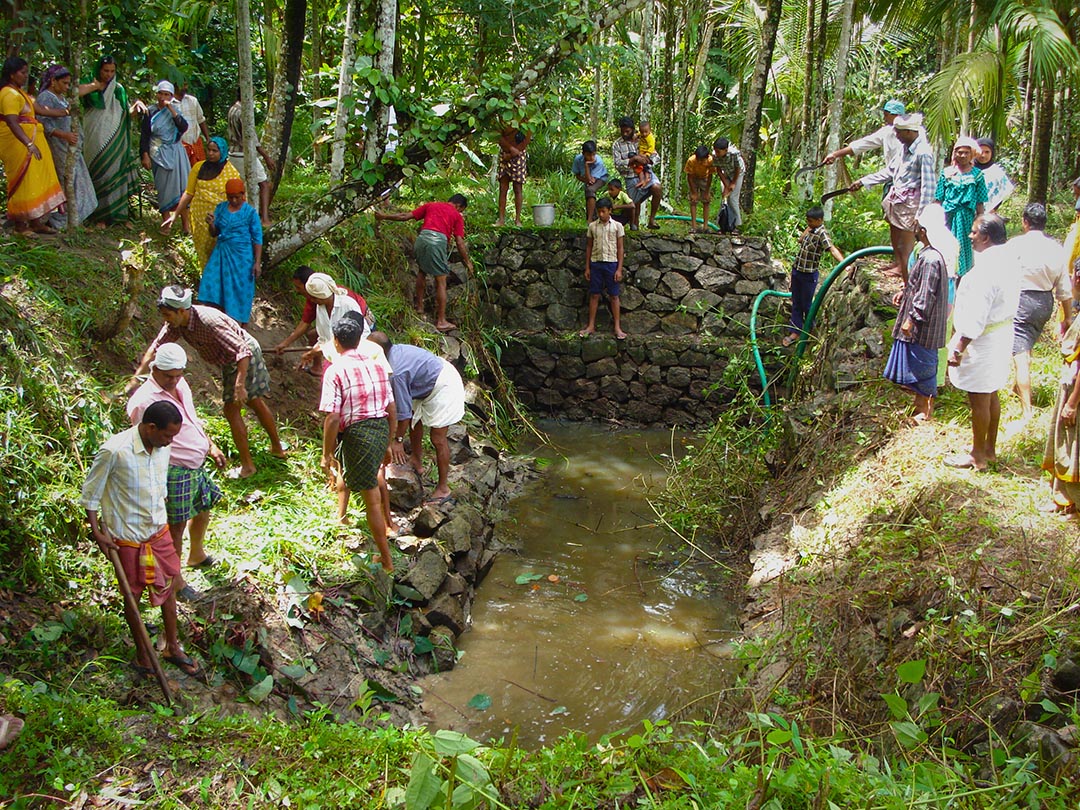
Natural Resource Management and Watershed Development
Watershed development, grounded in Natural Resource Management (NRM) and community participation, is globally recognized as a highly effective approach for achieving sustainable rural development. Arshabharath has consistently championed this watershed development approach. The
organization has successfully completed numerous watershed development projects in collaboration with the Western Ghat Development Cell under the Kerala State Planning Board and NABARD.
Renovation of Water Sources
As part of our watershed development efforts, Arshabharath implemented a series of targeted interventions to enhance water availability in the region. This includes reviving dried-up springs through debris removal and recharge structures, protecting deteriorated streams with erosion control measures and bank stabilization, and reclaiming neglected ponds by desilting and repairing their embankments. Additionally, Arshabharath has created new farm ponds to capture and store rainwater, ensuring a reliable source for irrigation. These comprehensive actions have significantly increased water resources, leading to an expansion in farming activities, particularly in paddy cultivation, and thereby improving agricultural productivity and community livelihoods.
Soil and Water Conservation
Our soil and water conservation activities are crucial for enhancing watershed health and agricultural productivity. We employed contour bunding to manage runoff and reduce soil erosion, constructed rain pits to capture and replenish groundwater, and utilized mulching to retain soil moisture and suppress weeds. Additionally, we strengthened stream embankments with vegetation and nature-friendly measures to prevent erosion and maintain water quality. These combined efforts have significantly improved soil fertility, water retention, and crop yields, contributing to a more resilient and sustainable agricultural environment.
Horticulture Development
In our horticulture development initiatives, we aimed to boost farm productivity and enhance family incomes by encouraging the cultivation of a variety of fruit trees. We provided participating families with a diverse selection of saplings and seedlings, including mango, sapota, orange, gooseberry, mangosteen, and jackfruit. These fruit trees not only contribute to the families’ nutritional needs by providing a steady supply of fresh fruits for personal consumption but also enhance community food security. As the trees begin to bear fruit, they offer an additional income source for farmers, fostering both economic growth and sustainable agricultural practices.
Livelihood Support
Our livelihood support initiatives are designed to enhance economic stability and self-sufficiency for families within the watershed area. We provided targeted assistance to identified families through various income-generating activities. This included support for dairying, enabling families to raise and manage livestock for milk production; goat farming, which offers a source of meat and milk; poultry farming, providing eggs and meat; and kitchen gardening, allowing families to grow their own vegetables and herbs. By fostering these activities, we aimed to diversify income sources, improve food security, and strengthen the overall economic resilience of the community. These efforts have empowered families to achieve greater financial independence and stability while contributing to local economic development.
Rain Water Harvesting
Our rain water harvesting initiatives are designed to address water scarcity and enhance access to water for both domestic and agricultural use. We implemented rain water harvesting systems by installing tanks with an average capacity of 5,000 liters for individual households. For larger groups and institutions, such as schools, we constructed bigger tanks ranging from 10,000 to 25,000 liters. These systems capture and store rainwater, reducing dependence on external water sources and improving water security. By enhancing water availability, these initiatives support both daily needs and agricultural activities, contributing to better health outcomes and sustainable resource management in the community.
Technical Support and Preparation of Detailed Project Reports
In our commitment to effective watershed management, we provided essential technical support and played a pivotal role in preparing Detailed Project Reports (DPRs) for various watershed projects. We collaborated closely with block and gram panchayats to develop comprehensive reports for implementing watershed initiatives across multiple panchayats. These DPRs were crafted following the guidelines of key nationwide programs such as the Integrated Watershed Management Program (IWMP) and the Western Ghat Development Programme (WGDP), under the advisement of the State Level Nodal Agency (SLNA) and the Western Ghat Cell. Each report outlined strategic plans for watershed conservation, resource management, and community engagement, ensuring a well-structured and effective approach to sustainable watershed development.
Other Programs and Activities
In addition to our core watershed management activities, we implemented several supplementary initiatives to support overall community well-being and development. These included:
These supplementary activities were integral to creating a holistic approach to watershed development, addressing not only environmental and agricultural needs but also enhancing the social and economic fabric of the community.
Our Projects